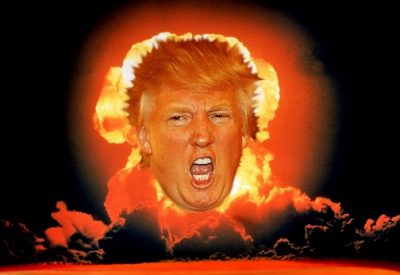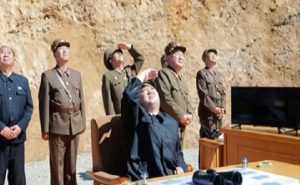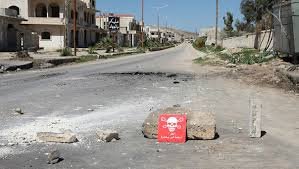Trump at the United Nations.

“The United States of America has been among the greatest forces for good in the history of the world, and the greatest defenders of sovereignty, security, and prosperity for all.” – US president Donald Trump’s speech to the United Nations General Assembly, 19 September 2017
If you are the president of the United States of America, then, as a rule, all pretense toward modesty is dispensed with. Call it American exceptionalism.
After all, the US is variously self-proclaimed as the leader of the free world, the beacon on the hill, and the indispensable nation.
Yet critical thinking demands an analysis of Trump’s words that is not provided by a cursory reading of the speech transcript, TV video coverage, or corporate media reporting. It is a given of corporatism that the US is unquestioningly not only great and good but the best of the best. Donald Trump would beg to differ, but he claims that he is making America great again.
Trump begins by stating,
“As millions of our citizens continue to suffer the effects of the devastating hurricanes that have struck our country…”
Yet this rings phony since Trump is skeptical about a connection between anthropogenic climate change and the increased incidence of catastrophic weather events.
Trump asserts,
“The American people are strong and resilient, and they will emerge from these hardships more determined than ever before.”
The prevailing trend under neoliberalism is that the American masses will continue to fall further and further behind, and the wealthy elitists will continue to make out like bandits. Trump’s tax cuts augur an intensification of this gaping trend.
Trump boasts,
“Fortunately, the United States has done very well since Election Day last November 8th.”
That is debatable. Nonetheless, there is nothing quite like self-aggrandizement… patting oneself on back in public and claiming credit for myriad allegedly positive events (as if stock market rises benefited the masses of Americans).
Moreover, says Trump,
“And it has just been announced that we will be spending almost $700 billion on our military and defense.”
Is this something to boast about? How about boasting about building hospitals, low-cost housing projects to end homelessness, poverty reduction/elimination, and environmental remediation? Of course, if a non-allied nation were to dare and inordinately hike military spending, chances are the US would castigate such a nation.
Trump proceeded to “address some of the very serious threats before us today…” Sheesh. Get real Trump. The people of the world recognize well that the USA as the number one threat to world peace.
Trump warns,
“But each day also brings news of growing dangers that threaten everything we cherish and value. Terrorists and extremists have gathered strength and spread to every region of the planet.”
This calls into question how to characterize Trump? A moderate? Or an extremist? Is building a wall on the US-Mexican border moderate or extreme? Is thwarting people from Muslim majority countries from entering the US a moderate or extreme position? Is launching military strikes against Muslim majority countries like Syria and Yemen moderate? Can resorting to violence be anything but extreme? Is allying with a terrorist-sponsoring nation like Saudi Arabia or an overtly racist nation like Israel moderate?
During his speech, Trump railed against rogue regimes, international criminal networks that traffic drugs (Trump wouldn’t be talking about the CIA, a major player in the international drug trade, would he?1), weapons (the US is a major exporter of weapons, illicit or otherwise), and the forced dislocation and mass migration of people (and what is the US but a nation state erected on the genocide and ethnic cleansing of the Indigenous nations of Turtle Island?).
Trump avers,
“We have it in our power, should we so choose, to lift millions from poverty, to help our citizens realize their dreams, and to ensure that new generations of children are raised free from violence, hatred, and fear…”
The key words, in italics: “should we choose.” Will the US ruling classes ever choose to share the wealth fairly and equitably? Or does it require a revolution to achieve dignity and fairness? The US might well learn from the Chinese how to accomplish ending poverty. The Chinese Communist Party has pledged to eliminate poverty by 2020.
Trump notes that the United Nations was founded following two world wars to help shape a better future. The preamble to the UN Charter states that the institution is determined “to save succeeding generations from the scourge of war…” But the UN’s inability to curtail the violence of the US renders this aim nugatory.
Trump says that 70 years ago, that the United States developed “the noble idea” of the Marshall Plan to help restore Europe. The Marshall Plan, while helping war-ravaged Europe to its feet, was designed to restore markets for US products from a US that was ascendant after World War II, having profited immensely from supplying all sides in the war and having escaped the carnage on its own soil.2
Trump:
“We do not expect diverse countries to share the same cultures, traditions, or even systems of government. But we do expect all nations to uphold these two core sovereign duties: to respect the interests of their own people and the rights of every other sovereign nation.”
And who determines this? The people of sovereign nations? The UN or the US?
Trump:
“In America, we do not seek to impose our way of life on anyone, but rather to let it shine as an example for everyone to watch.”
This is so risible. So the uninvited US military in Syria is not imposing on Syrians? President Assad made clear that the US troops are viewed as “invaders.” “Way of life” aside, is the US is not imposing in Yemen? Does the US not seek to impose on (or at least dictate to) Venezuela, Iran, and North Korea?
Trump spoke to the greatest words in the United States Constitution: “We the people.” Is this spoken tongue-in-cheek or from ignorance? The constitution, derived from the Six Nation Confederacy’s Great Law of Peace, was promulgated by rich, white men. “We the people,” however, was not meant to include the Indigenous people, Blacks, women, or the toiling classes in anything approximating a meaningful sense. And contemporary US society continues to adduce this marginalization. Any gains made were by people resistingthe system and making demands on the government.
Putting on his historian’s hat, Trump puffs out his American chest:
“It is an eternal credit to the American character that even after we and our allies emerged victorious from the bloodiest war in history, we did not seek territorial expansion, or attempt to oppose and impose our way of life on others.”
Historian Jacques Pauwels wrote of the “uncontested fact that after the war [the US and Britain] would install or support dictatorial regimes in many countries…,”3 Communism/socialism was to be prevented from growing or spreading.4 At the end of WWII, socialism was also to be prevented in Korea, and a dictatorship was installed in the south of Korea.
Despite promising not to get bogged down in foreign conflicts during his presidential campaign, Trump states:
“We must reject threats to sovereignty, from the Ukraine to the South China Sea.”
He calls for a joint fight against “those who threaten us with chaos, turmoil, and terror”: “a small group of rogue regimes that violate every principle on which the United Nations is based.” Who are the rogue regimes? And what are the principles they violate? One assumes that it is implied that the US never violates any of these said principles.
Trump does not mince words when it comes to the Democratic People’s Republic of Korea:
“No one has shown more contempt for other nations and for the well-being of their own people than the depraved regime in North Korea.”
Does the US provide tuition-free university education, no-fee medical services, and housing for all its citizens? The DPRK does.
Trump continues his harangue:
“It is responsible for the starvation deaths of millions of North Koreans, and for the imprisonment, torture, killing, and oppression of countless more.”
First, there were many factors beyond the control of the DPRK government: from winding up with only 14 percent of the cultivatable land after division; with the collapse of the Soviet Union, loans were called back and fertilizer and fuel shortages arose; also no government anywhere can be held accountable for the vagaries of Mother Nature that resulted in severe crop devastation.5 Second, the DPRK government performed admirably in mitigating the effects of crop failure, as attested to by the UN Food and Agricultural programme.6 Third, former president Jimmy Carter criticized the US government, and its South Korean ally, for human rights abuses in withholding food aid to North Korea. One also wonders where Trump gets off criticizing any other country for torture and incarceration given the recent US history in Bagram, Abu Ghraib, Guantanamo Bay, etc. As for killing? Who kills more than the US? And which countries exactly is it that DPRK is oppressing? Certainly not Syria, Yemen, Palestine, Libya, Iran, Venezuela, etc.
Trump:
“We were all witness to the regime’s deadly abuse when an innocent American college student, Otto Warmbier, was returned to America only to die a few days later. We saw it in the assassination of the dictator’s brother using banned nerve agents in an international airport. We know it kidnapped a sweet 13-year-old Japanese girl from a beach in her own country to enslave her as a language tutor for North Korea’s spies.”
Whatever alleged crimes previous or present DRPK administrations committed, what must first play out is a credible, impartial legal determination of guilt; it is then that the guilty party deserves condemnation and justice should be meted out. However, given the sovereign equality of nations as recognized by the UN, the crimes of the US must also be subject to international law. The crimes of the US are too numerous to list in this article.7
Trump:
“If this is not twisted enough, now North Korea’s reckless pursuit of nuclear weapons and ballistic missiles threatens the entire world with unthinkable loss of human life.”
This is inflammatory rhetoric. Every sane thinker realizes that DPRK will not initiate a nuclear strike. It has a no-first-use policy. The US does not have such a policy. So there is no threat from North Korea. It seeks a deterrence; especially given that the US is still at work with the DPRK and that the US is the only nation ever to have used nukes on civilian populations. But the US does not like being faced with a credible deterrent.
If the US is so opposed to nuclear weapons and ICBMs, there is nothing to stop the US from denuclearizing. It seems most likely that every nuclear power would abide to concurrently denuclearize (although US ally Israel might throw a wrench in such a plan).
Trump uses the UN headquarters as a bully pulpit:
“The United States has great strength and patience, but if it is forced to defend itself or its allies, we will have no choice but to totally destroy North Korea. Rocket Man is on a suicide mission for himself and for his regime.”
Ah Trump, not the slightest pretense at diplomacy, even while speaking to world’s assembled diplomats. Yet, there is no call for the US to defend itself against vis-à-vis a nation pledged to no-first use.
Trump:
“It is time for North Korea to realize that the denuclearization is its only acceptable future.”
Denuclearization is the only sane future for all nation states. And disarmament is the future for a world dedicated to ending the scourge of war.
The next bogeyman for Trump:
“The Iranian government masks a corrupt dictatorship behind the false guise of a democracy.”
Can it be that Trump considers the dictatorship of the Shah — imposed by the US, after the CIA engineered an overthrow of the elected government of Iran — was a genuine democracy?
Trump:
“Oppressive regimes cannot endure forever, and the day will come when the Iranian people will face a choice…. In Saudi Arabia early last year, I was greatly honored to address the leaders of more than 50 Arab and Muslim nations… to confront terrorists and the Islamist extremism…”
Ergo, Saudi Arabia is not an oppressive regime? Wahhabism is not Islamic extremism?
Trump moves on to his next target for opprobrium, Syria:
“The actions of the criminal regime of Bashar al-Assad, including the use of chemical weapons against his own citizens — even innocent children — shock the conscience of every decent person. No society can be safe if banned chemical weapons are allowed to spread. That is why the United States carried out a missile strike on the airbase that launched the attack.”
That the Syrian government forces would use chemical weapons is highly dubious and has minimal credibility. Regarding chemical weapons, as Stephen Zunes wrote,
“[The US] has no leg to stand on.”
Next up for Trump:
“The socialist dictatorship of Nicolas Maduro has inflicted terrible pain and suffering on the good people of that country.”
It does not matter that Venezuela has elections open to international monitors and whose outcome is not decided by an electoral college but by the number of votes cast by citizens. Trump can bloviate about dictatorships and twist facts to corrupted forms of propaganda and disinformation. Critical thinkers will assess the veracity of the source, and the verisimilitude of the information; they will also seek independent sources of information and analyses to help form conclusions. Perhaps best of all, where possible people will travel to a country to witness for themselves the situation and glean insight by conversing with the locals.8
Trump is ideological:
“The problem in Venezuela is not that socialism has been poorly implemented, but that socialism has been faithfully implemented. From the Soviet Union to Cuba to Venezuela, wherever true socialism or communism has been adopted, it has delivered anguish and devastation and failure.”
I would ask Trump to identify “true” capitalism (as in capitalism that does not rely on socialism to underpin it) anywhere. Education, health care, police, roads and bridge construction, militaries that are funded by public money are all examples of socialism. And just how much do the 13.5 percent of Americans who live below the poverty line care for the ideology of capitalism, or the half-million-plus Americans who find themselves homeless on any given night? I would ask Trump to provide one example of successful capitalism. Capitalism has been a failure everywhere.9
Trump asks,
“The true question for the United Nations today, for people all over the world who hope for better lives for themselves and their children, is a basic one: Are we still patriots?”
Did the Indigenous peoples of Turtle Island not love where they lived? Did they love being dispossessed and swallowed by the European diaspora into the US? What about the Hawaiians? Did they not love living in their islands? Or the Puerto Ricans? Do they not love their country? Or the Chamorro people? Or how about the Chagossians who were forced from the Chagos archipelago and prevented from returning so the US could use it as a base of military operations.
Or does love of one’s country only apply to Americans?
Kim Petersen is a former co-editor of the Dissident Voice newsletter. He can be reached at: [email protected]. Twitter: @kimpetersen.
Notes
1. See Douglas Valentine, “Chapter 2: One Thing Leads to Another: My Rare Access in Investigating the War on Drugs,” in The CIA as Organized Crime: How Illegal Operations Corrupt America and the World(Atlanta: Clarity Press, 2017).
2. Jacques R. Pauwels, The Myth of the Good War (Toronto: Lorimer, 2015), wrote, “The famous plan did not amount to a free gift; it was not a generous present amounting to billions of dollars, but a complex system of credits and loans.” p. 261.
3. Pauwels, p. 139-140.
4. Pauwels, p. 270-273.
5. See Nhial Esso, “North Korea’s famine was caused by outside forces,” in What You Don’t Know About North Korea Could Fill a Book (Intransitive Publishers International, 2013).
6. Esso, “North Korea’s policies alleviate the effects of food shortages,” in What You Don’t Know About North Korea…
7. See William Blum, Rogue State (Common Courage Press, 2000).
8. See Joshua Frank, Kim Petersen, and Sunil K. Sharma, “Revolution of Hope,” Dissident Voice, 10 August 2006.
9. “We are taught [capitalism] is a system that works; that it’s a system that has brought prosperity. We’ve heard that all our lives. Now I’m going to try and convince you otherwise, and I’m going to do it in two minutes. [laughter] It’s very simple. Almost the entire world is capitalist and almost the entire world is poor. Capitalist Indonesia is miserably poor and getting poorer; capitalist India is miserably poor and getting poorer; so with capitalist Thailand, and capitalist Nigeria, and capitalist El Salvador, and Haiti, and Mexico, and Brazil, and Argentina. And capitalist Russia, and Poland, and Bulgaria with all the privatization and deregulation and free markets coming in: poverty, poverty, increase in crime, increase in desperation, increase in misery, increase in homelessness, increase in suicides. It’s capitalism at work — moving in. Now not everyone suffers. The capitalists in these countries are doing quite well. These countries are getting poorer as the giant corporations move in and get richer. These [countries] are getting poorer as there is more and more deregulation, more and more so-called free market, which is really monopoly market. It’s a free market if you got money. It’s a market that works for those who have money.” — Michael Parenti, formerly available at workingtv.com.



